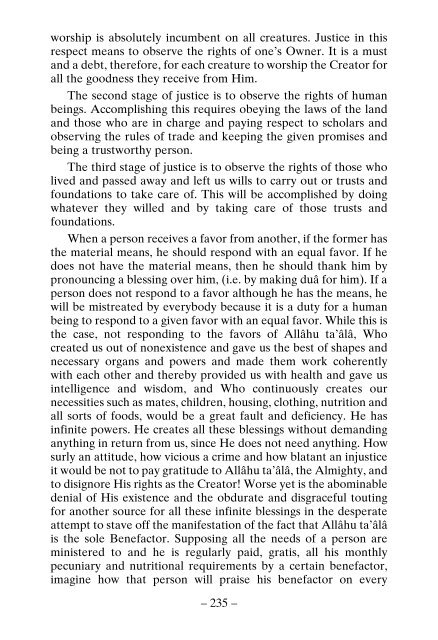Ethics of Islam
Ethics of Islam is taken from the book Berîka by Muhammad Hâdimi. Immorality and ways to get rid of it; 40 depravities and cures to them; usefulness of ethics; what is a soul; strengths of a soul; Personalities emanating from wisdom, courage, chastity and justice are extensively explained.
Ethics of Islam is taken from the book Berîka by Muhammad Hâdimi. Immorality and ways to get rid of it; 40 depravities and cures to them; usefulness of ethics; what is a soul; strengths of a soul; Personalities emanating from wisdom, courage, chastity and justice are extensively explained.
Create successful ePaper yourself
Turn your PDF publications into a flip-book with our unique Google optimized e-Paper software.
worship is absolutely incumbent on all creatures. Justice in this<br />
respect means to observe the rights <strong>of</strong> one’s Owner. It is a must<br />
and a debt, therefore, for each creature to worship the Creator for<br />
all the goodness they receive from Him.<br />
The second stage <strong>of</strong> justice is to observe the rights <strong>of</strong> human<br />
beings. Accomplishing this requires obeying the laws <strong>of</strong> the land<br />
and those who are in charge and paying respect to scholars and<br />
observing the rules <strong>of</strong> trade and keeping the given promises and<br />
being a trustworthy person.<br />
The third stage <strong>of</strong> justice is to observe the rights <strong>of</strong> those who<br />
lived and passed away and left us wills to carry out or trusts and<br />
foundations to take care <strong>of</strong>. This will be accomplished by doing<br />
whatever they willed and by taking care <strong>of</strong> those trusts and<br />
foundations.<br />
When a person receives a favor from another, if the former has<br />
the material means, he should respond with an equal favor. If he<br />
does not have the material means, then he should thank him by<br />
pronouncing a blessing over him, (i.e. by making duâ for him). If a<br />
person does not respond to a favor although he has the means, he<br />
will be mistreated by everybody because it is a duty for a human<br />
being to respond to a given favor with an equal favor. While this is<br />
the case, not responding to the favors <strong>of</strong> Allâhu ta’âlâ, Who<br />
created us out <strong>of</strong> nonexistence and gave us the best <strong>of</strong> shapes and<br />
necessary organs and powers and made them work coherently<br />
with each other and thereby provided us with health and gave us<br />
intelligence and wisdom, and Who continuously creates our<br />
necessities such as mates, children, housing, clothing, nutrition and<br />
all sorts <strong>of</strong> foods, would be a great fault and deficiency. He has<br />
infinite powers. He creates all these blessings without demanding<br />
anything in return from us, since He does not need anything. How<br />
surly an attitude, how vicious a crime and how blatant an injustice<br />
it would be not to pay gratitude to Allâhu ta’âlâ, the Almighty, and<br />
to disignore His rights as the Creator! Worse yet is the abominable<br />
denial <strong>of</strong> His existence and the obdurate and disgraceful touting<br />
for another source for all these infinite blessings in the desperate<br />
attempt to stave <strong>of</strong>f the manifestation <strong>of</strong> the fact that Allâhu ta’âlâ<br />
is the sole Benefactor. Supposing all the needs <strong>of</strong> a person are<br />
ministered to and he is regularly paid, gratis, all his monthly<br />
pecuniary and nutritional requirements by a certain benefactor,<br />
imagine how that person will praise his benefactor on every<br />
– 235 –

















